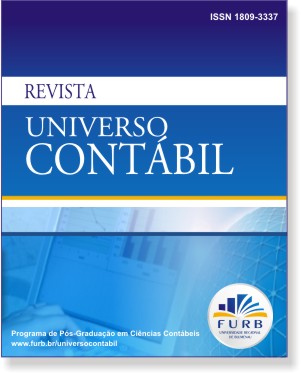EGRESSOS EM CIÊNCIAS CONTÃBEIS: ANÃLISE DO DESENVOLVIMENTO PROFISSIONAL SOB O ENFOQUE DA TEORIA DO CAPITAL HUMANO
DOI:
https://doi.org/10.4270/ruc.20106Palavras-chave:
Capital humano. Egressos. Ciências contábeis.Resumo
O estudo objetiva investigar o desenvolvimento profissional dos egressos do curso de ciências contábeis da Universidade do Oeste de Santa Catarina (UNOESC) no que tange à influência do bacharelado, sob o enfoque da teoria do capital humano. Caracteriza-se como uma pesquisa descritiva, utilizando-se dos procedimentos da pesquisa survey e abordagem quantitativa. A amostra consistiu de 144 egressos do curso de ciências contábeis da UNOESC, nos campi de São Miguel do Oeste-SC e Pinhalzinho-SC. Na coleta de dados foi utilizado um questionário estruturado com perguntas fechadas, aplicado no período de julho a setembro de 2008. Os resultados da pesquisa indicaram que a maioria dos egressos exerce atividade remunerada ligada à área contábil e são empregados no setor privado. Ainda, que a universidade foi fundamental para o aperfeiçoamento do capital humano e melhoria da qualidade da vida em sociedade. Relativamente às alterações na vida pessoal e profissional após a obtenção do título de bacharel em ciências contábeis, um dos aspectos mais evidenciados foi o amadurecimento pessoal. Conclui-se, de forma geral, que os egressos obtiveram um aperfeiçoaram do capital humano com a titulação, melhorando o nível de renda, oportunidades de trabalho, competitividade profissional, influenciando positivamente a vida em sociedade e para que se tornassem pessoas mais responsáveis e confiantes.Downloads
Downloads
Publicado
Como Citar
Edição
Seção
Licença
Os direitos autorais para artigos publicados nesta revista são do autor, com direitos de primeira publicação para a revista. Em virtude de aparecerem nesta revista de acesso público, os artigos são de uso gratuito, com atribuições próprias, em aplicações educacionais e não-comerciais. A revista permitirá o uso dos trabalhos publicados para fins não-comerciais, incluindo direito de enviar o trabalho para bases de dados de acesso público. Os artigos publicados são de total e exclusiva responsabilidade dos autores.
• O(s) autor(es) autoriza(m) a publicação do artigo na revista;
• O(s) autor(es) garante(m) que a contribuição é original e inédita e que não está em processo de avaliação em outra(s) revista(s);
• A revista não se responsabiliza pelas opiniões, ideias e conceitos emitidos nos textos, por serem de inteira responsabilidade de seu(s) autor(es);
• É reservado aos editores o direito de proceder ajustes textuais e de adequação do artigo às normas da publicação;
• O(s) autor(es) declaram que o artigo não possui conflitos de interesse.


